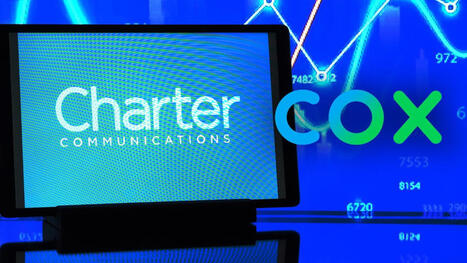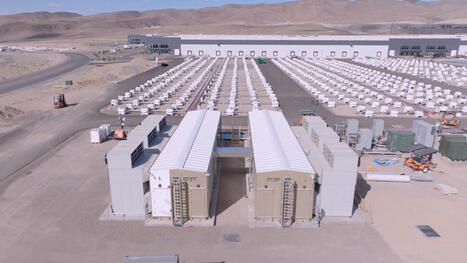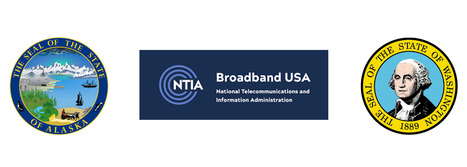 Your new post is loading...
 Your new post is loading...
The public access television station has become one of Vermont’s most reliable sources of campaign coverage.
Attorney General Pam Bondi announced federal charges Friday against 30 more people who are accused of civil rights violations in a January protest inside a Minnesota church where a pastor works for Immigration and Customs Enforcement.
BOSTON — The Healey-Driscoll Administration received approval for $18.8 million under the National Telecommunications and Information Administration’s (NTIA) Broadband Equity, Access, and Deployment (BEAD) program. The funding will enable the Massachusetts Technology Collaborative’s (MassTech) Massachusetts Broadband Institute (MBI) to implement high-speed broadband infrastructure to all remaining unserved and underserved locations in the state, including 251 communities, 2,565 homes and businesses, and 1,243 community anchor institutions. The BEAD program expands internet access through a variety of technologies, including fiber optics as well as hybrid fiber-coaxial and low Earth orbit satellite internet. The program builds on the foundation of prior state and federal investments by MBI through the Executive Office of Economic Development that have brought Massachusetts to over 99 percent statewide broadband coverage, including awards made under the state-funded Last Mile Grant programs and the federally funded Gap Networks Program.
Federal agencies have issued a warning that made its way to top officials at the White House.
AI is too powerful and too new to be set free from human oversight. On Tuesday, in a closed-door meeting, Secretary of Defense Pete Hegseth issued a blunt ultimatum to Anthropic CEO Dario Amodei: Strip the ethical guardrails from your AI models by Friday or face the full weight of the state. The terms of the threat were stark. If Anthropic does not allow the Pentagon “all lawful uses” of its Claude models, Hegseth will invoke the Defense Production Act to compel cooperation, he warned—or, even more devastatingly, designate Anthropic as a supply-chain risk. The latter would effectively blacklist Anthropic from doing business with any entity that touches the Department of Defense. Yesterday evening, Amodei gave his answer. He rejected Hegseth’s “best and final offer,” writing, “I believe deeply in the existential importance of using AI to defend the United States and other democracies, and to defeat our autocratic adversaries.” However, he continued, “in a narrow set of cases, we believe AI can undermine, rather than defend, democratic values.” He concluded that the Pentagon’s “threats do not change our position: we cannot in good conscience accede to their request.”
With its twirly cord and landline-like features, the Tin Can is giving kids a crash course in phone etiquette. For example: Talk!
While Anthropic has an existing partnership with the Pentagon, the AI company has remained firm that its technology not be used for mass domestic surveillance or fully autonomous weaponry. Anthropic has reached a stalemate with the United States Department of War over the military’s request for unrestricted access to the AI company’s technology. But as the Pentagon’s Friday afternoon deadline for Anthropic’s compliance approaches, more than 300 Google employees and over 60 OpenAI employees have signed an open letter urging the leaders of their companies to support Anthropic and refuse this unilateral use. Specifically, Anthropic stood in opposition to the use of AI for domestic mass surveillance and autonomous weaponry. The open letter’s signatories seek to encourage their employers to “put aside their differences and stand together” to uphold the boundaries Anthropic has asserted.
The FCC on Friday announced that it has given the green light to Charter Communications’ $34.5 billion merger with Cox Enterprises. The merger will combine the cable, commercial fiber and cloud businesses of the companies. When the deal was announced last year, the companies said that the combination would have 38 million subscribers.
I’ve been hearing for years about how good broadband can open access to telemedicine. It’s certainly something that is increasingly needed as rural hospitals and clinics are closing across the country. But telehealth is not just a rural issue, and a recent article by Sean Gonsalves points out a successful telehealth program in San Francisco.
Palantir Technologies has a permanent desk at the U.S.-led Civil Military Coordination Center (CMCC) headquarters in southern Israel, three sources from the diplomatic community inside the CMCC told Drop Site News. According to the sources, the artificial intelligence data analytics giant is providing the technological architecture for tracking the delivery and distribution of aid to Gaza. The presence of Palantir and other corporations—along with recent changes banning non-profits unwilling to give data to Israeli authorities—is creating a situation in which the delivery of aid is taking a backseat to the pursuit of profit, investment, and the training of AI products, experts say.
Democratic senators — and at least one Republican — are urging the Pentagon to withdraw its ultimatum to Anthropic, insisting Congress must participate in the debate over military use of artificial intelligence. Why it matters: The unprecedented showdown between the Department of Defense and Anthropic has largely been a two-party contest. Now Congress wants to enter the fray.
Artificial intelligence is quickly moving from novelty to necessity. What began with chatbots and content generation is now expanding into everyday applications: smart homes, immersive entertainment, intelligent collaboration tools, real-time cloud services, and AI-assisted workflows across industries. As AI becomes more integrated into daily life, one reality is becoming clear: AI performance is only as strong as the network beneath it.
- Iridium did direct-to-device satellite phones decades ago
- These days Iridium considers itself an IoT company
- It's tapping into the 3GPP's NB-IoT standard to make space-based IoT connectivity easier than ever
If you asked people at a trivia night who invented low-Earth-orbit (LEO) satellites, a lot of them might say “Elon Musk.” Incorrect! Actually, the first LEO satellites were launched by the U.S. government, starting in the 1950s. And the first commercial LEO satellite operator was Iridium, who’s been using LEO satellites and providing direct-to-device (D2D) connectivity for decades. But it wasn’t until Elon Musk began launching LEOs that they gained wide attention.
|
Petition calls for the FCC service rules supporting 5G direct-mode technology in the 1.7 GHz and 5.4 GHz spectrum bands for first-responder use.
This is the moment to find a better solution. But the winning coalition must be as broad and as honest as the problem is large.
Alarms raised over Paramount Skydance's bid to acquire Warner Bros. Discovery, sparking fears of media censorship and antitrust violations.
OLYMPIA, Wash. — The National Telecommunications and Information Administration (NTIA) approved Washington’s final Broadband Equity, Access, and Deployment (BEAD) Program proposal, clearing the way for the Washington State Broadband Office (WSBO) to begin awarding $736 million in federal funding and $112 million in state match funding to bring high-speed internet to every part of the state. That combines with other sources for more than a billion in total funding to support broadband expansion. The approval is a significant milestone in Washington’s efforts to close the digital divide and ensure that every resident has access to reliable, high-speed internet. BEAD projects will bring about 166,500 businesses and households online over the next four years in Washington.
Public Knowledge submitted an amicus brief recently opposing Google’s motion for a partial stay of the remedies in the search monopoly case.
WASHINGTON, Feb. 27, 2026 – Major telecom trade groups are urging the Supreme Court to find that the industry’s main federal regulator can’t issue fines for violations of its rules. CTIA, NCTA, and USTelecom submitted a joint filing with the high court Wednesday arguing the Federal Communications Commission’s process for fining companies, as outlined in the Communications Act, was unconstitutional. The high court will hear arguments on the issue in April.
A former Trump AI official blasted the Pentagon's blacklisting of Anthropic as "attempted corporate murder" on Friday. Why it matters: It's a recognition of the stakes in the administration's effort to cull what Trump calls a "woke" company — one that happens to have lately dominated the field.
United States Secretary of Defense Pete Hegseth directed the Pentagon to designate Anthropic as a “supply-chain risk” on Friday, sending shockwaves through Silicon Valley and leaving many companies scrambling to understand whether they can keep using one of the industry’s most popular AI models. “Effective immediately, no contractor, supplier, or partner that does business with the United States military may conduct any commercial activity with Anthropic,” Hegseth wrote in a social media post. The designation comes after weeks of tense negotiations between the Pentagon and Anthropic over how the US military could use the startup’s AI models. In a blog post this week, Anthropic argued its contracts with the Pentagon should not allow for its technology to be used for mass domestic surveillance of Americans or fully autonomous weapons. The Pentagon asked that Anthropic agree to let the US military apply its AI to “all lawful uses” with no specific exceptions. A supply chain risk designation allows the Pentagon to restrict or exclude certain vendors from defense contracts if they are deemed to pose security vulnerabilities, such as risks related to foreign ownership, control, or influence. It is intended to protect sensitive military systems and data from potential compromise. Anthropic responded in another blog post on Friday evening, saying it would “challenge any supply chain risk designation in court,” and that such a designation would “set a dangerous precedent for any American company that negotiates with the government.”
Anthropic vowed to challenge the Pentagon in court over its blacklisting of the company for refusing to lift all safeguards on the military's use of its model, Claude — adding it's "deeply saddened" by the escalating dispute. Why it matters: The frontier AI company is doing what few other companies have done since Trump's second term began — directly and publicly challenging the administration. - President Trump and Defense Secretary Pete Hegseth threatened earlier Friday to cut off Anthropic from a plethora of customers through a "supply chain risk" designation — treatment that historically has been reserved for foreign adversaries.
Public backlash over the data center boom is leading to a variety of draconian policies — including bans on new construction.
Over the past few days, Alaska and Washington have joined the ranks of approved BEAD final proposals. The two allocated 62% and 60% of original BEAD allotments, respectively. This brings the approved total to 52 of 56.
As for our two newly approved states, Mississippi and Vermont, the only notable change is Vermont lost ~1K fiber BSLs, moving over to LEO. Below you will see that very little changed from the two states’ proposal and the final version.
WASHINGTON, Feb. 26, 2026 – Rep. Jennifer McClellan, D-Va., said her biggest challenge as a policymaker is getting colleagues to care about modernizing the Telecommunications Act of 1996, a law she feels no longer applies due to rapid technological growth. House Democrat emphasized need to create more AI regulation and the importance of federal investment in broadband.
|




 Your new post is loading...
Your new post is loading...
























